Discover 35 hidden attractions, cool sights, and unusual things to do in Dubuque (United States). Don't miss out on these must-see attractions: National Mississippi River Museum & Aquarium, Q Casino, and Kennedy Mall. Also, be sure to include Port of Dubuque Marina in your itinerary.
Below, you can find the list of the most amazing places you should visit in Dubuque (Iowa).
Table of Contents
National Mississippi River Museum & Aquarium
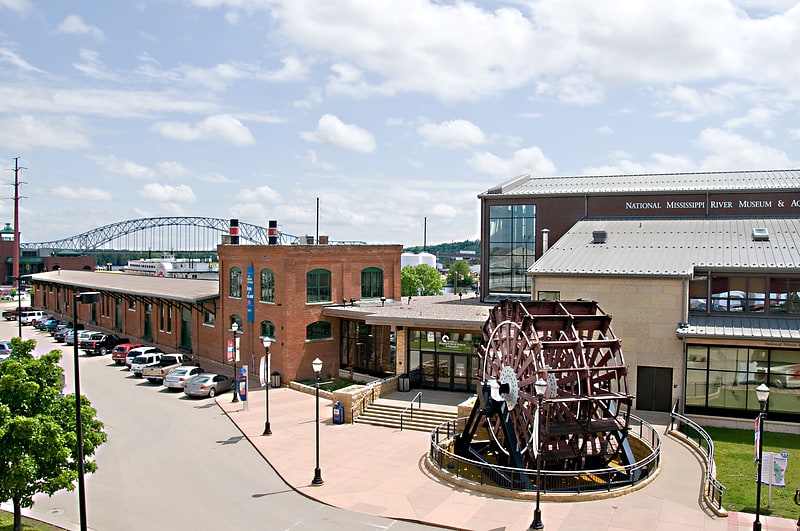
The National Mississippi River Museum & Aquarium is a museum located in Dubuque, Iowa, USA. The museum is a property of the Dubuque County Historical Society, with two centers on the riverfront campus: the Mississippi River Center and the National River Center. The museum originally opened as the Fred W. Woodward Riverboat Museum in 1982 before being expanded and re-organized into its current form.
The museum is an affiliate of the Smithsonian Institution, and is accredited by the American Alliance of Museums (AAM) and the Association of Zoos and Aquariums (AZA).[1]
Address: 350 E 3rd St, 52001 Dubuque
Q Casino
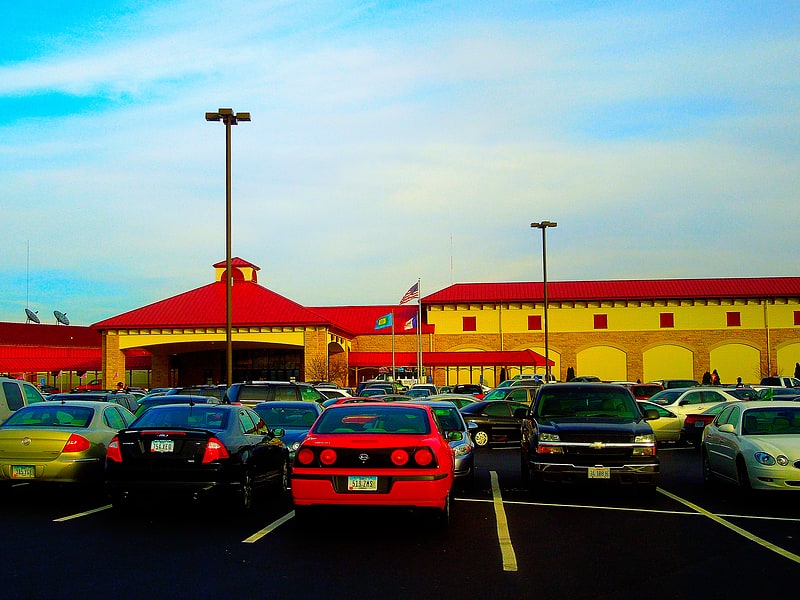
Casino in Dubuque, Iowa. Q Casino is a combination greyhound race track and casino located in Dubuque, Iowa. The casino is owned by the City of Dubuque, and operated by the non-profit Dubuque Racing Association, its license holder. It is a member of the Iowa Gaming Association, and shares a gaming license with the Diamond Jo Casino, also in Dubuque. Beginning operations on June 1, 1985, the track became a full-service casino following the introduction of table games in 2005.
Q Casino is located on Chaplain Schmitt Island, near the Mississippi River. The casino, along with attractions in the Port of Dubuque and Downtown Dubuque, have helped to create a large and growing tourism market in Dubuque.[2]
Address: Dubuque, 1855 Greyhound Park Drive
Kennedy Mall
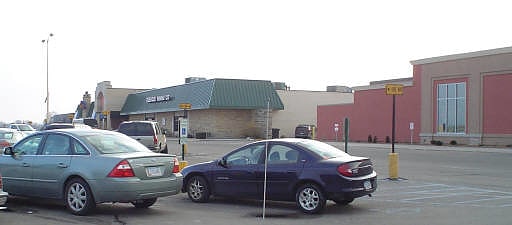
Shopping mall in Dubuque, Iowa. Kennedy Mall is a shopping mall located in Dubuque, Iowa. It is owned by the Cafaro Company. The mall's anchor stores are Edward Jones, Shoe Carnival, Planet Fitness, Vertical Jump Park, JCPenney, Dick's Sporting Goods, Ulta Beauty, and Books-A-Million. There are 2 vacant anchor stores that were once 2 Younkers stores.[3]
Address: 555 John F Kennedy Rd, 52002 Dubuque
Port of Dubuque Marina
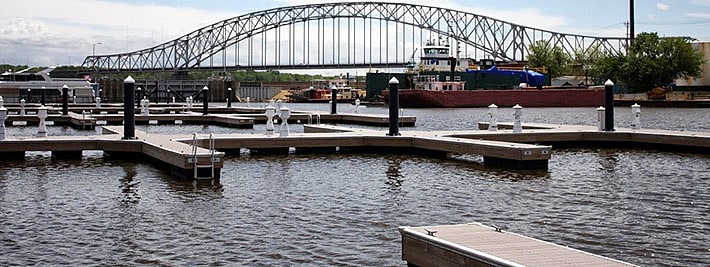
Marina in Dubuque, Iowa. The Port of Dubuque Marina is a 100% transient marina, there are no permanent slip holders. The Port of Dubuque Marina's seventy-eight slips include fifty-four 30", twenty 40", and four 50". By utilizing the end ties, or T-heads of the docks, the Port of Dubuque Marina can accommodate a boat up to 100" in length. The docks are rented out to boaters by the day, with a maximum stay of ten consecutive days. The Port of Dubuque Marina also offers an hourly rate for boaters who would like to dock and stay for only a short time and enjoy some of the many nearby attractions. In addition to slip rentals the Port of Dubuque Marina offers fuel sales, and pump out services to visiting boats. The amenities building houses private boater restrooms with shower and laundry facilities, public restrooms, and a Marina convenience store.[4]
Address: 450 E 3rd St, 52001 Dubuque
Sundown Mountain Resort
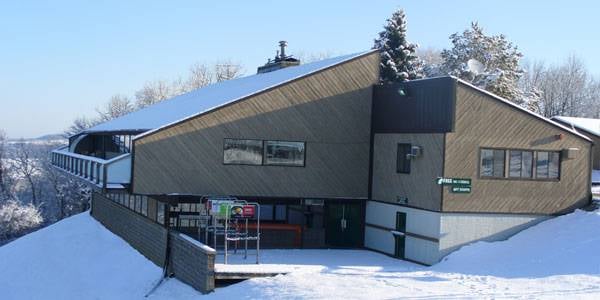
Winter sport, Park, Outdoor activities, Ski area
Address: 16991 Asbury Rd, 52002-9493 Dubuque
Eagle Point Park
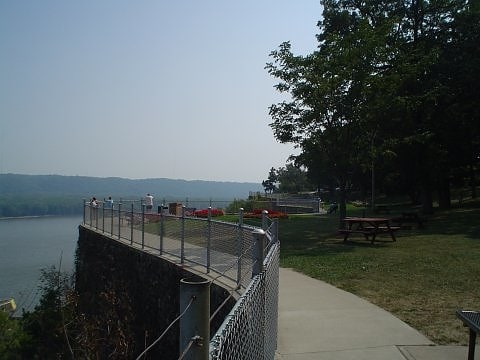
Park in Dubuque, Iowa. Eagle Point Park is a 164-acre public park located in the northeast corner of the city of Dubuque, Iowa, United States. Eagle Point is mostly situated on a bluff that overlooks the Mississippi River and the Lock and Dam No. 11. The park is owned and operated by the city of Dubuque. It was listed as a historic district on the National Register of Historic Places in 2017. At the time of its nomination it contained 34 resources, which included 14 contributing buildings, seven contributing sites, five structures, five objects, two non-contributing buildings, and two non-contributing structures.[5]
Address: Shiras Avenue, 52004 Dubuque
St. Raphael's Cathedral
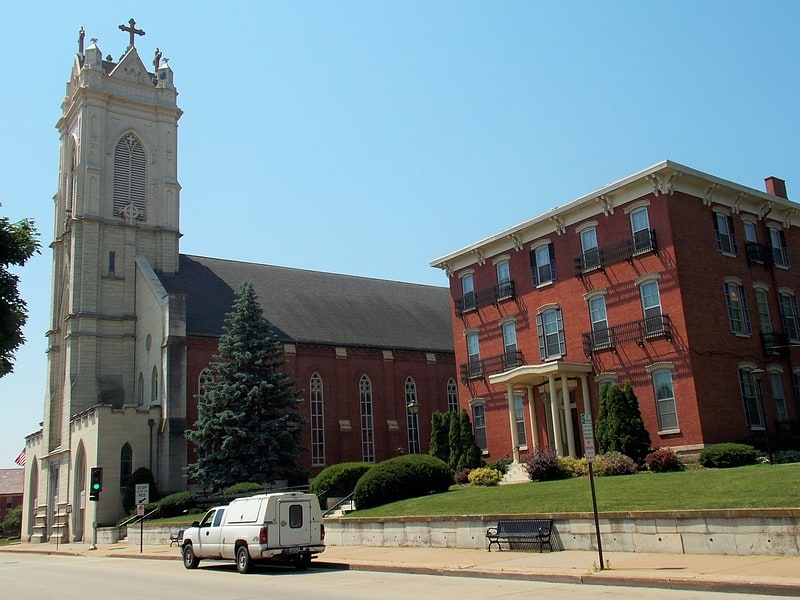
Cathedral in Dubuque, Iowa. St. Raphael's Cathedral is a Catholic cathedral and a parish church in the Archdiocese of Dubuque located in Dubuque, Iowa. The parish is the oldest congregation of any Christian denomination in the state of Iowa. The cathedral church, rectory, former convent, and former parochial school building are a contributing properties in the Cathedral Historic District on the National Register of Historic Places.[6]
Address: 231 Bluff St, 52001 Dubuque
Diamond Jo Casino
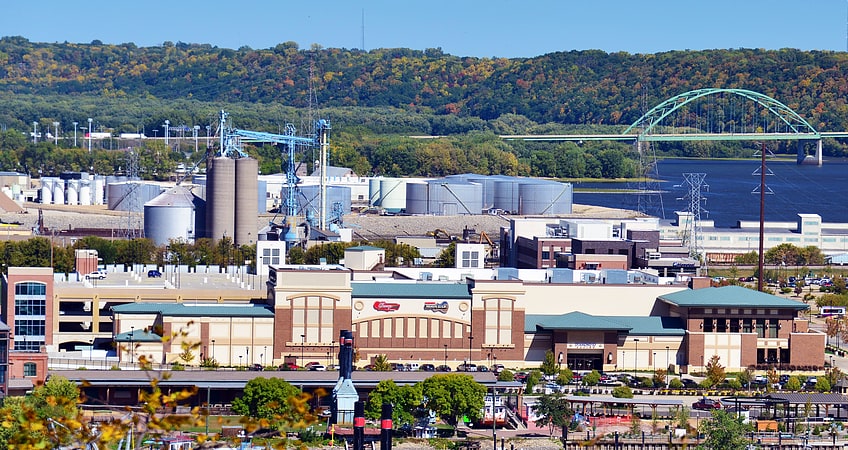
Casino in Dubuque, Iowa. The Diamond Jo Casino is a gambling casino and entertainment complex located in the Port of Dubuque, in Dubuque, Iowa. The casino is owned and operated by Las Vegas-based Boyd Gaming, which also owns the Diamond Jo Casino - Worth in Northwood, Iowa. It is a member of the Iowa Gaming Association, and its license is held by the Dubuque Racing Association, which operates Q Casino. Beginning operations on May 18, 1994, the Diamond Jo was a 3-level, 305-foot, 1,500-passenger vessel in Dubuque's Ice Harbor. The boat was a dockside that did not cruise, the casino became land-based when its new facility opened December 11, 2008.
The Diamond Jo Casino is located at 301 Bell Street, in the rapidly developing Port of Dubuque. The casino, along with the nearby National Mississippi River Museum & Aquarium and other attractions, have helped to create a large and growing tourism market in Dubuque.[7]
Address: Dubuque, 301 Bell Street, Dubuque, Iowa 52001
Dubuque Arboretum and Botanical Gardens
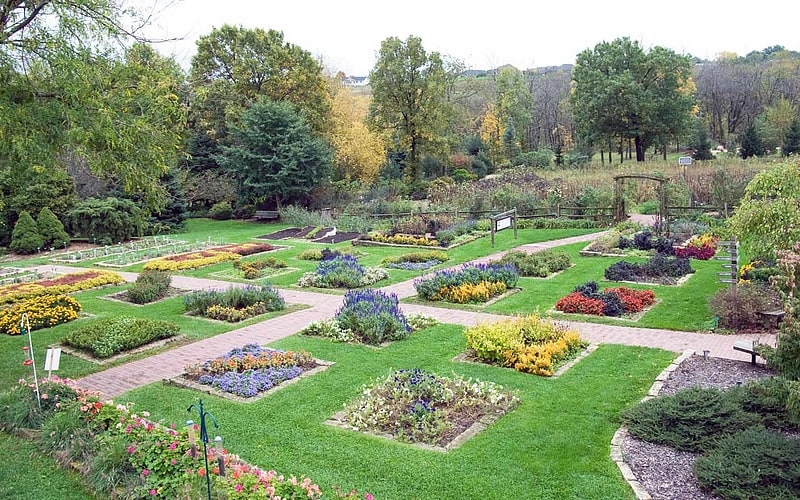
Arboretum in Dubuque, Iowa. The Dubuque Arboretum and Botanical Gardens 52 acres are an arboretum and botanical gardens established in 1980 and located at 3800 Arboretum Drive, Dubuque, Iowa. It is open, without charge, daily throughout the year. The arboretum is the largest in the United States staffed entirely by volunteers. The Arboretum is a popular spot in the community for outdoor weddings and is also a venue for musical entertainment during the summer months.
The Gardens include what is claimed to be the largest public hosta garden in the United States, as well as Annual and Perennial Gardens, several Children's gardens, an English Knot garden and Formal English Garden, Herb Garden, Cactus garden, Iowa State and All American Test Gardens, Japanese garden designed by Hoichi Kurisu, and Rose Gardens. Also notable are the collections of unusual conifers and dwarf conifers.[8]
Address: 3800 Arboretum Dr, 52001-1040 Dubuque
Fenelon Place Residential Historic District
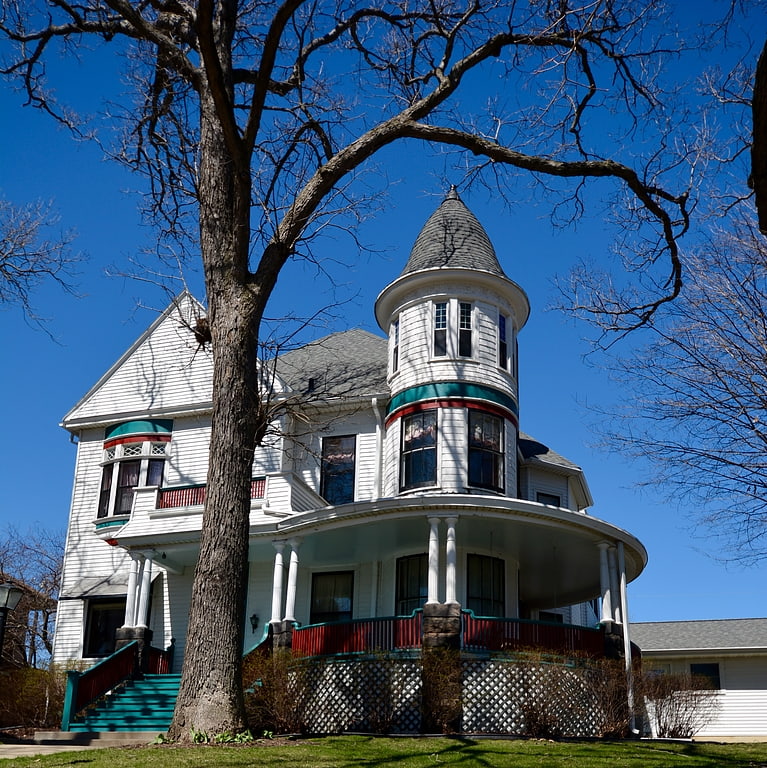
The Fenelon Place Residential Historic District is a nationally recognized historic district located in Dubuque, Iowa, United States. It was listed on the National Register of Historic Places in 2015. At the time of its nomination it consisted of 218 resources, which included 171 contributing buildings, two contributing structures, one contributing site, 43 non-contributing buildings, and one non-contributing structure. The residential area that makes up the district is located on a plateau located directly above the Mississippi River Valley. This was the first bluff-top neighborhood in Dubuque that established elevator service. The first Fenelon Place Elevator, listed on the National Register in 1978, was completed in 1894. Early houses on the plateau were small cottages built by lead miners. They were replaced by large houses that were built in two periods. The first period at the end of the 19th century saw houses built in the Italianate, Gothic Revival, Second Empire, and Queen Anne styles. House in the second period in the beginning of the 20th century were largely built in the Classical Revival and Tudor Revival styles.[9]
Julien Dubuque Bridge
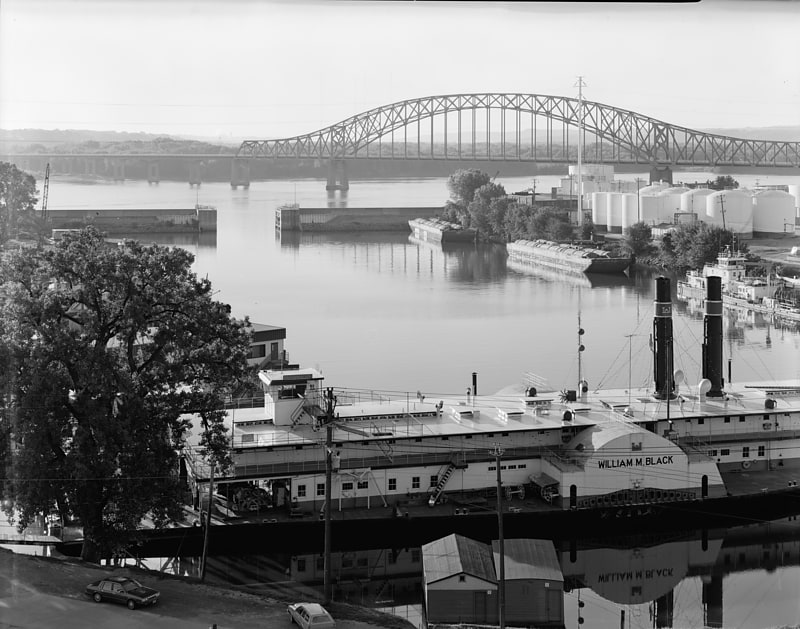
Continuous truss bridge in Jo Daviess County, Illinois. The Julien Dubuque Bridge crosses the Mississippi River. It joins the cities of Dubuque, Iowa, and East Dubuque, Illinois. The bridge is part of U.S. Route 20. It is one of two automobile bridges over the Mississippi in the area, and is listed in the National Register of Historic Places.[10]
Mathias Ham House
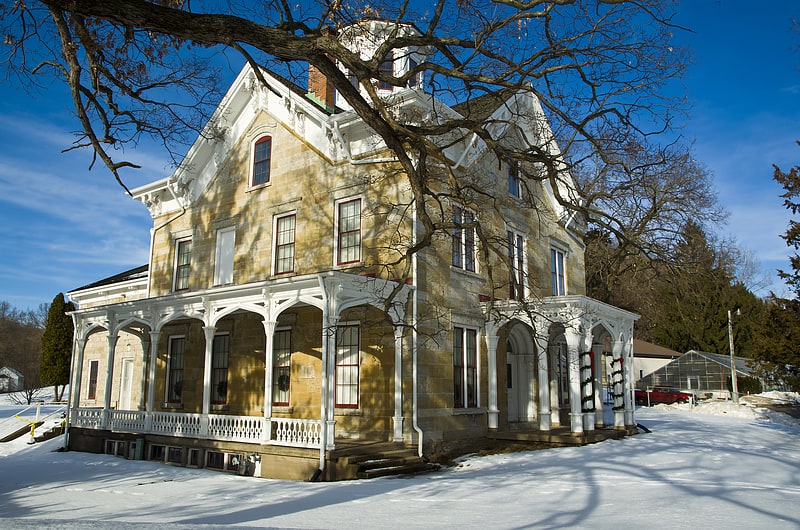
Museum in Dubuque, Iowa. The Mathias Ham House is a 19th-century house in Dubuque, Iowa that is on the National Register of Historic Places. It is located at the intersection of Shiras and Lincoln Avenues, near the entrances to Eagle Point Park and Riverview Park.[11]
Address: 2241 Lincoln Ave, 52001-1424 Dubuque
New Melleray Abbey
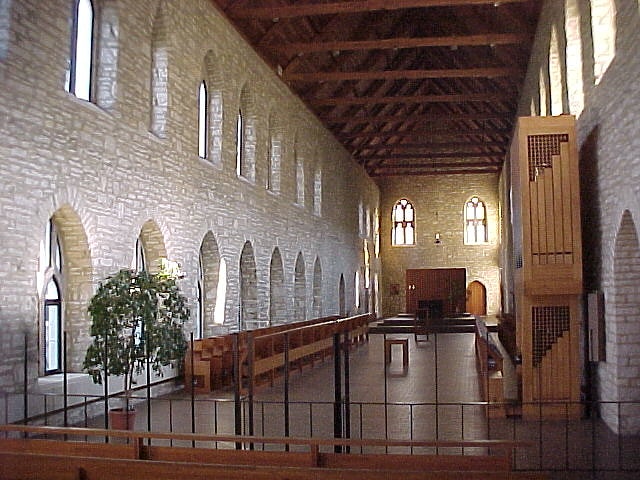
Monastery in Dubuque County, Iowa. New Melleray Abbey is a Trappist monastery located near Dubuque, Iowa. The abbey is located about 15 miles southwest of Dubuque and is in the Archdiocese of Dubuque. Currently the Abbey is home to about 28 monks. Several of the monks work in their business, Trappist Caskets, and some of their food comes from the garden behind the Abbey. The abbot of the monastery is Dom Mark Scott, who was elected by the community for a 6-year term on July 15, 2014.[12]
Address: 6632 Melleray Cir, 52068-7079 Peosta
Five Flags Center
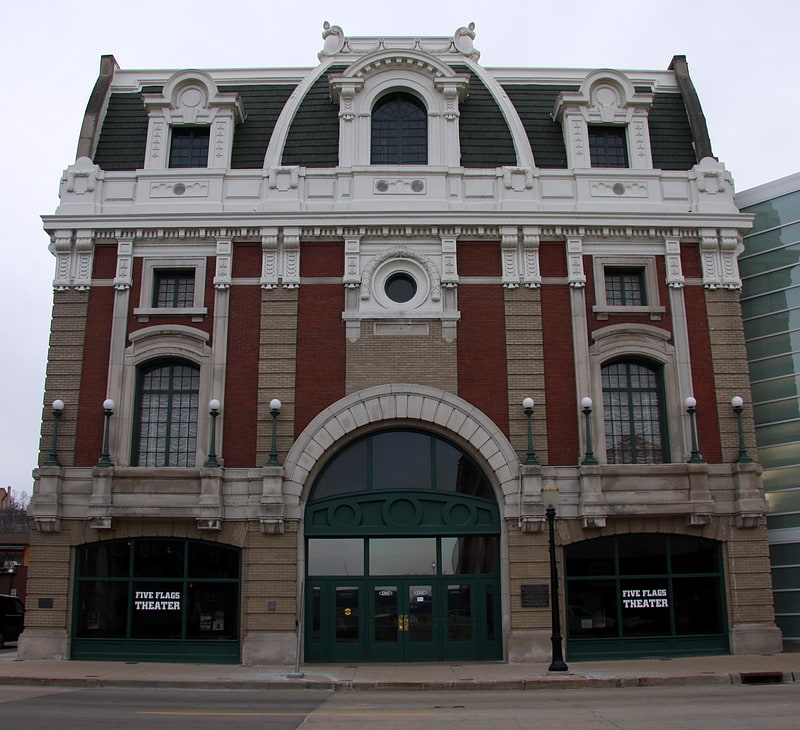
Event venue in Dubuque, Iowa. Five Flags Center is a multi-purpose facility in downtown Dubuque, Iowa. It is named for the five flags that have flown over Dubuque; the Fleur de Lis of France, the Royal Flag of Spain, the Union Jack of Great Britain, the French Republic Flag of Napoleon & America's Stars and Stripes.[13]
Address: 405 Main St, 52001 Dubuque
Dubuque–Wisconsin Bridge
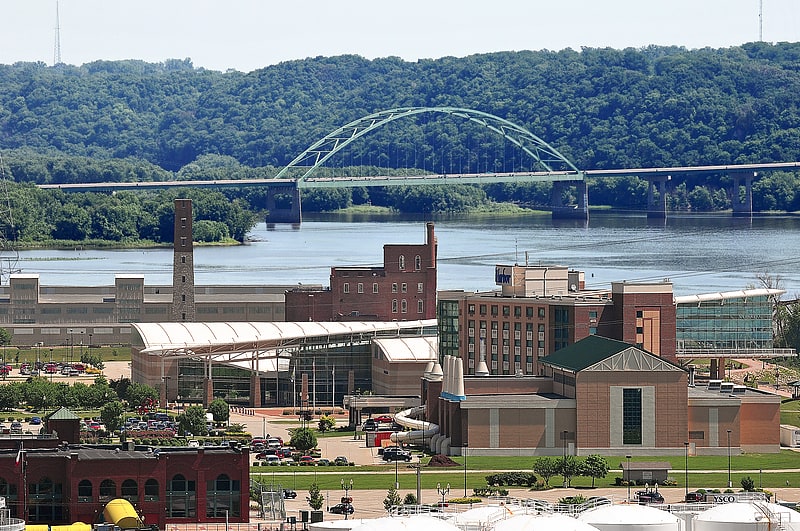
Tied-arch bridge in Dubuque, United States. The Dubuque–Wisconsin Bridge is a steel bowstring arch automobile bridge connecting Dubuque, Iowa, with still largely rural Grant County, Wisconsin, over the Mississippi River. It is one of two automobile bridges in the Dubuque area, the other being the Julien Dubuque Bridge, which is located about three miles south.
The bridge is a four lane, limited access bridge and is part of US Highway 61/US Highway 151 (US 61/US 151). This bridge replaced the older Eagle Point Bridge that previously served as the connection between Dubuque and Wisconsin.[14]
St. Luke's United Methodist Church
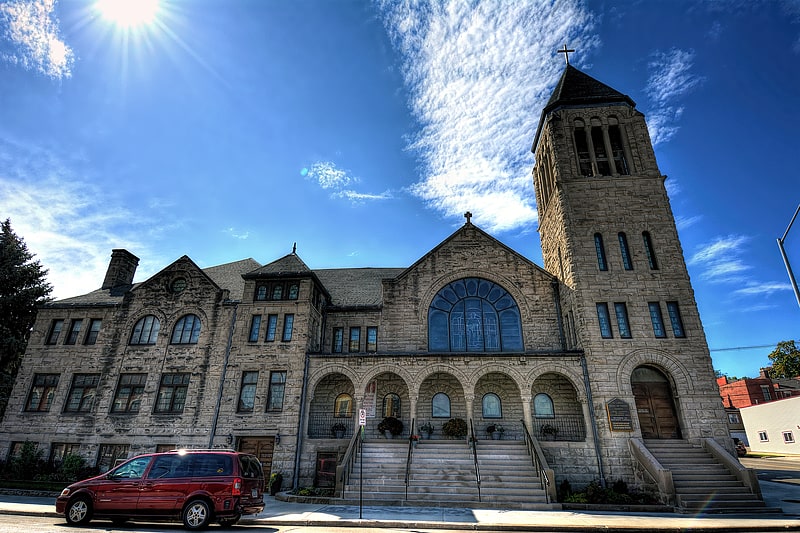
United methodist church in Dubuque, Iowa. St. Luke's United Methodist Church, also known as St. Luke's Methodist and as St. Luke's United Methodist, is an historic Richardsonian Romanesque-style church located at 1199 Main Street in Dubuque, Iowa. It was individually listed on the National Register of Historic Places in 1998, and as a contributing property in the Upper Main Street Historic District in 2005. It is part of the Iowa Conference of the United Methodist Church.
The church has more Tiffany windows than any other church in the state.
According to its NRHP nomination, the building is significant for its history in religion in Dubuque, for its Richardsonian Romanesque (unique in Dubuque), and for its Tiffany glass.[15]
Address: 1199 Main St, 52001-4778 Dubuque
Washington Park
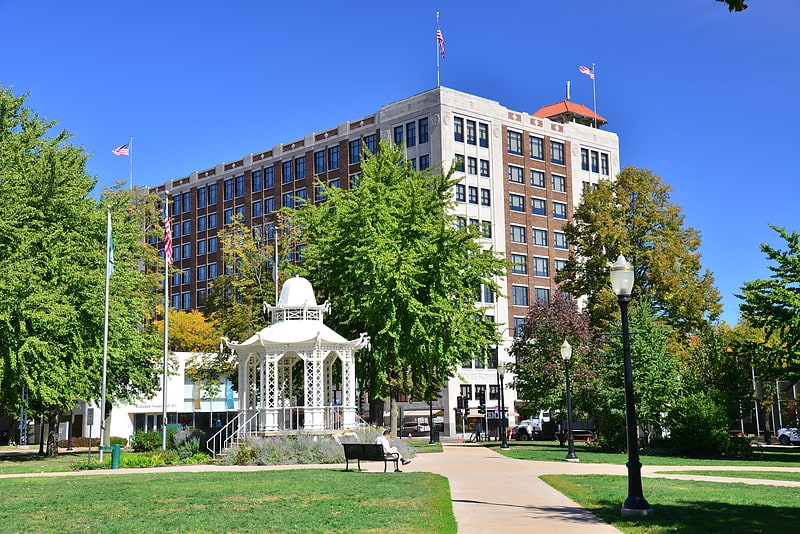
Park in Dubuque, Iowa. Washington Park is a small public, urban park located in Downtown Dubuque, Iowa, United States. The park encompasses an entire city block, bordered on the north by West 7th Street, on the west by Bluff Street, on the south by West 6th Street, and on the east by Locust Street. The park is located between the city's post office and the Dubuque Museum of Art.
It was individually listed on the National Register of Historic Places in 1977, and it was included as a contributing property in the Cathedral Historic District in 1985.[16]
Address: 700 Locust St, Dubuque
Dubuque City Hall
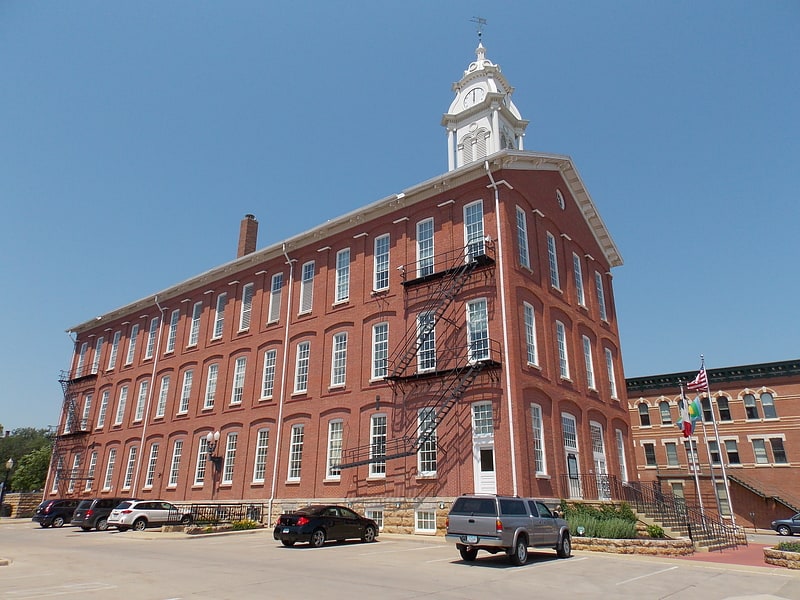
Dubuque City Hall is located in Dubuque, Iowa, United States. The building was designed by J.N. Moody after Faneuil Hall in Boston and the Fulton Street Market in New York City. Dubuque architect John F. Rague served as the supervising architect during construction. Following a Medieval tradition, the city market was located on the first floor, municipal offices were located on the second floor, and a ballroom for civic events was located on the third floor.
The three-story brick structure rests on a raised limestone basement. It features a gable roof with bracketed eaves. Each gable has a circular window. The 11-foot (3.4 m) tall windows are located in bays defined by arches. The building was first occupied in February 1858. Initially, the main floor was divided into stalls. They were converted into additional office space for the city when the market relocated. The third floor ballroom was converted into an archery and pistol range for the police department, a bowling alley, and a horseshoe pitching area. The original cupola, which held a bell and four-faced clock, became deteriorated and was removed from the building in 1954. The bell was placed in the plaza next to city hall. The building was listed on the National Register of Historic Places in 1972. A new cupola was created using the original design, and it was erected in 1990. The bell was returned to the tower at that time.[17]
Address: Central Avenue, 52001 Dubuque
Dubuque County Courthouse
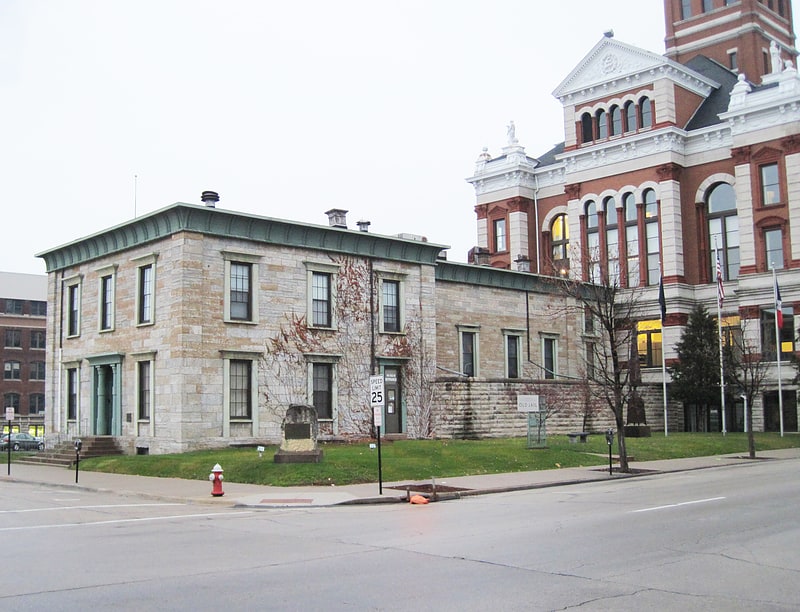
Building in Dubuque, Iowa. The Dubuque County Courthouse is located on Central Avenue, between 7th and 8th Streets, in Dubuque, Iowa, United States. The current structure was built from 1891 to 1893 to replace an earlier building. These are believed to be the only two structures to house the county courts and administrative offices.
The courthouse houses several county government offices including the county auditor, treasurer, attorney, and facilities for the Iowa District Court for Dubuque County.[18]
Address: Central Avenue, 52001 Dubuque
Town Clock
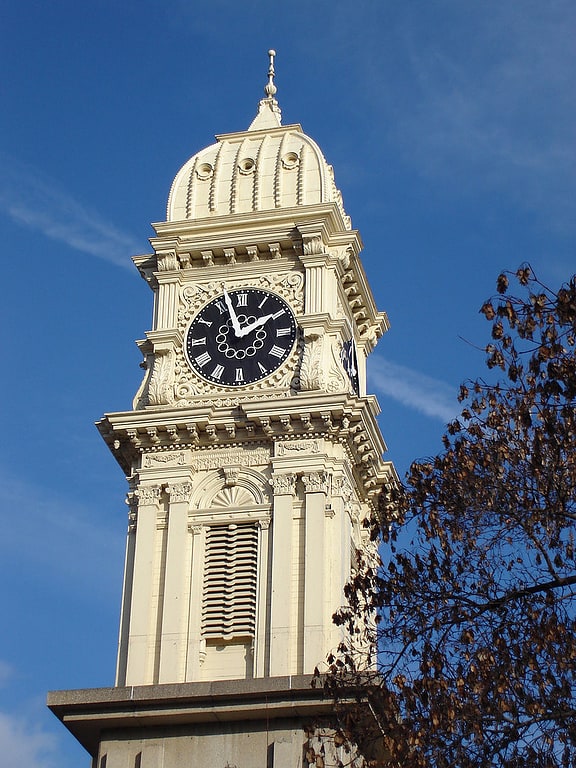
Historical landmark in Dubuque, Iowa. The Town Clock is a large clock that stands in downtown Dubuque, Iowa. The clock has stood over the city for over 130 years. The present clock is the second "Town Clock"; the first collapsed in the 1870s, killing three people. The building on which it originally stood is listed on the National Register of Historic Places, but the clock tower itself is not.[19]
Shot Tower
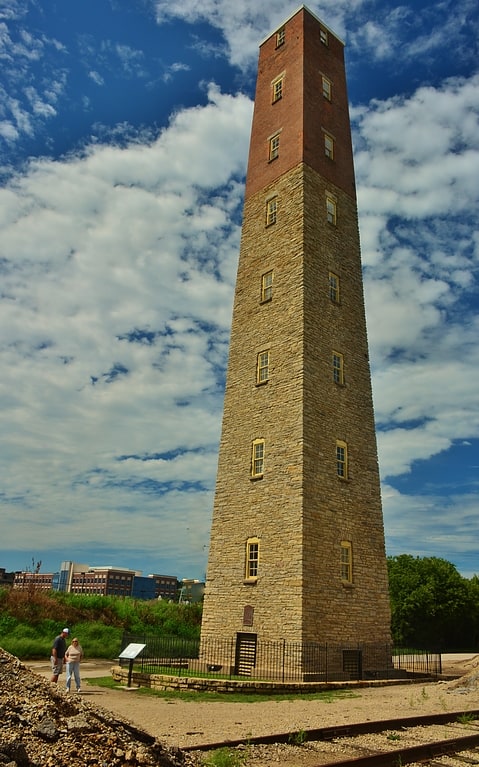
Tower in Dubuque, Iowa. The Shot Tower located in Dubuque, Iowa, is one of the last remaining shot towers in the United States. It is listed on the National Register of Historic Places and remains a recognized symbol of the city. At its location near the Mississippi River, the Tower can be seen from the riverwalk and is currently undergoing extensive renovations. It stands 120 feet 5 inches tall.[20]
Address: 600 E Commercial St, 52001 Dubuque
Park Farm Winery
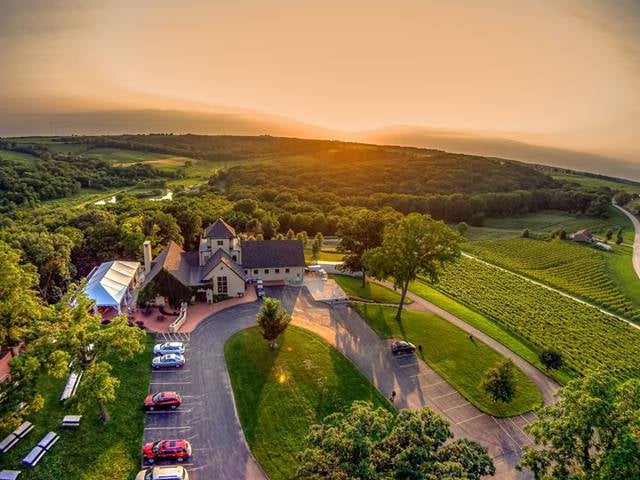
Park, Relax in park, Winery, Food and drink
Address: 15159 Thielen Road, Dubuque
Grand Opera House
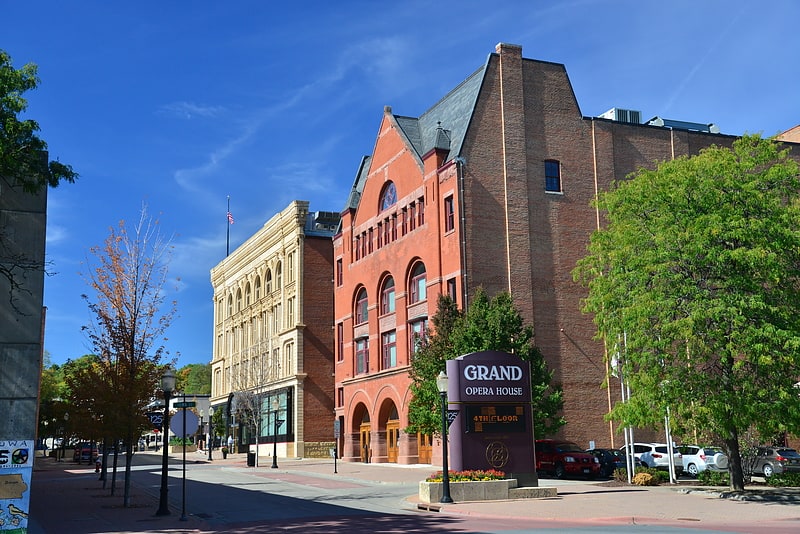
Opera house in Dubuque, Iowa. The Grand Opera House is an opera house located at the corner of 8th and Iowa Streets in Dubuque, Iowa that was built in 1890. It was listed on the National Register of Historic Places in 2002.
It was deemed important as a "national treasure". The theatre has the largest of all stages ever in Dubuque, and is Dubuque's only surviving opera house. It is architecturally important as an early Richardsonian Romanesque building in Dubuque and as a salient work of Chicago architect Willoughby James Edbrooke. It is Edbrooke's only surviving opera house, and he used its design in his design portfolio that won him the position of Supervising Architect of the U.S. Treasury Department in 1891. Its design is said to be "representative of Edbrooke's smooth exterior wall interpretation of the Richardsonian Romanesque style." It is also historically important from its association with high-quality theatre in Dubuque during 1890-1928. The theater has been preserved with great historic integrity and, in 2002, was being restored for continuing use in live stage entertainment. Its history is extremely well documented.
In 2015 performance events at the theater marked its 125th anniversary.[21]
Address: 135 W 8th St, Dubuque
Lock and Dam No. 11
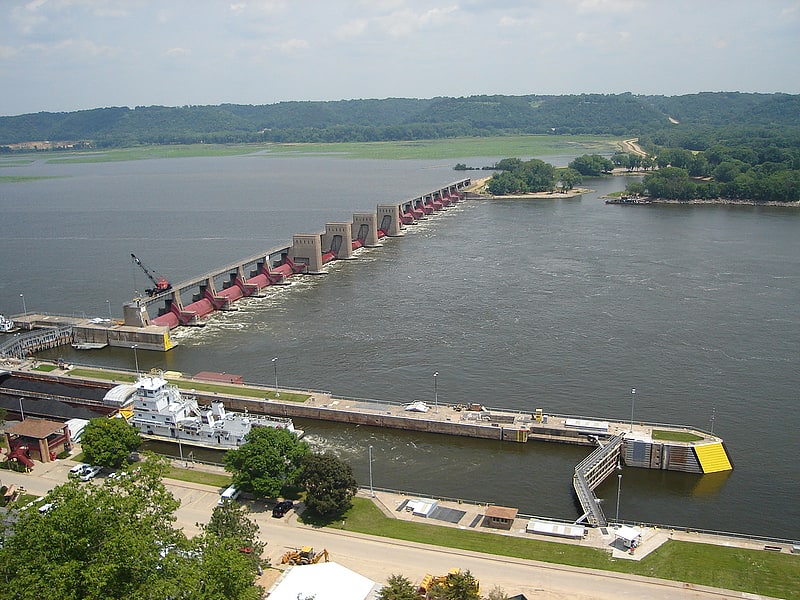
General Zebulon Pike Lock and Dam No. 11 is a lock and dam located between Dubuque, Iowa, and rural Grant County, Wisconsin, on the Upper Mississippi River.
It was opened to navigation 14 September 1937.[22]
Saint Patrick's Church
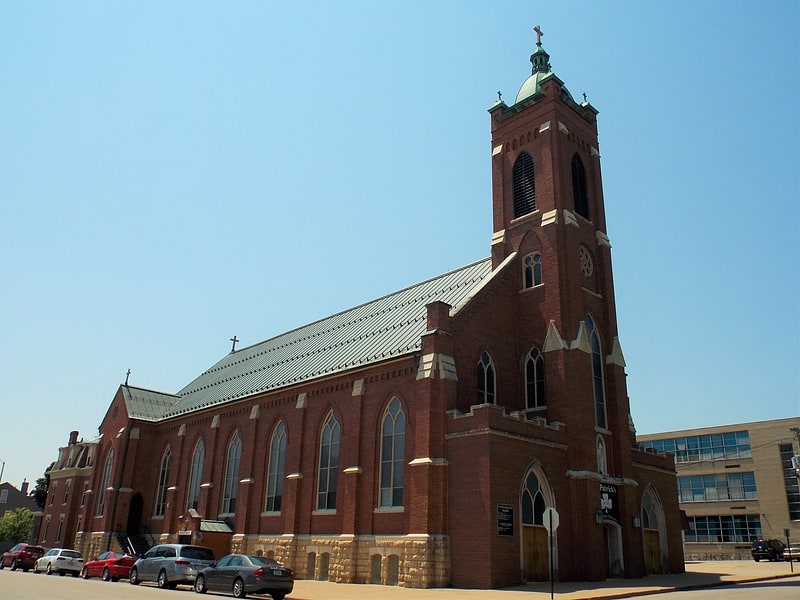
Catholic church in Dubuque, Iowa. Saint Patrick's Church is a Catholic parish in the Archdiocese of Dubuque, and is located at 15th and Iowa Streets, Dubuque, Iowa, United States. The church and rectory were included as contributing properties in the Jackson Park Historic District that was listed on the National Register of Historic Places in 1986. St. Patrick's Church is located two blocks away from St. Mary's Church. The reason for the close proximity of the two parishes was that St. Mary was originally built for service to German families of Dubuque, and St. Patrick's provided services for the Irish settlers to Dubuque.[23]
Address: 1425 Iowa Street, Dubuque
Carnegie-Stout Public Library
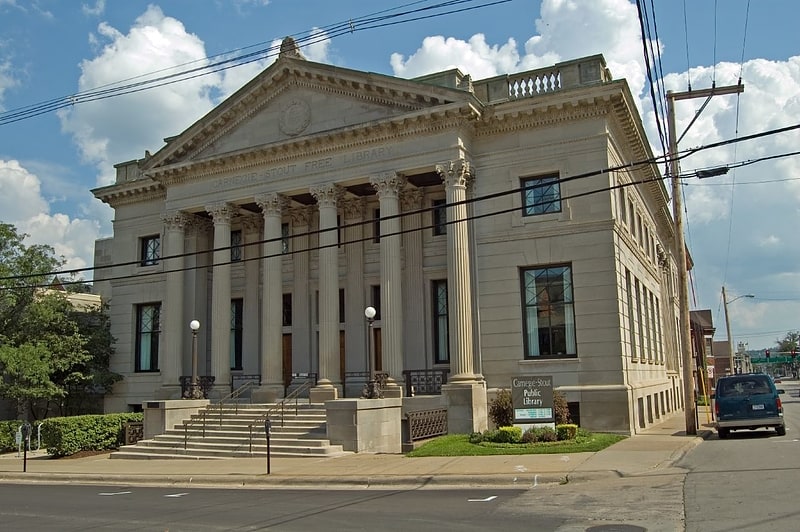
Public library. The Carnegie-Stout Public Library is located in Dubuque, Iowa, United States. The public library had its beginnings with the Young Men's Literary Association, established in 1859, and their book collection was the basis for the library's collection. The books were housed in a variety of buildings over the years. The community applied for a grant from Andrew Carnegie who on January 12, 1901, contributed $71,500 to build the library building. Local businessman Frank D. Stout donated the property, which was worth $20,000, in honor of his father Henry L. Stout. The two-story Bedford stone and brick building was designed by Chicago architects W. G. Williamson and John Spencer. It is considered one of the finest examples of the Classical tradition of Beaux-Arts architecture in Iowa. The main facade is dominated by a Roman Corinthian portico that was modeled after the Pantheon in Rome. Its fluted columns are matched with pilasters on the wall behind. The building was dedicated on October 17, 1902, and it opened three days later. It was individually listed on the National Register of Historic Places in 1975, and it was included as a contributing property in the Jackson Park Historic District in 1986. An addition was added to the east side of the building in 1981.[24]
Address: 360 W 11th St, 52001-4625 Dubuque
Dubuque County Jail
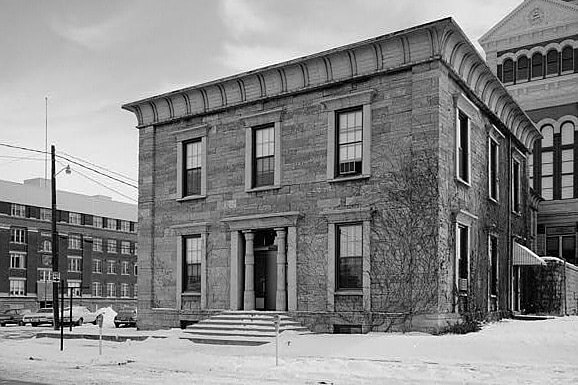
Museum in Dubuque, Iowa. The Dubuque County Jail is a historic building at 36 East 8th Street in Dubuque, Iowa, United States. Completed in 1858, the jail is an example of the uncommon Egyptian Revival style. It is architecturally a highly original work of John F. Rague, who also designed the 1837 Old Capitol of Illinois and the 1840 Territorial Capitol of Iowa. The building was designated a National Historic Landmark for its architecture in 1987. It served as a jail for more than a century, became a museum in 1975, and was converted into county offices in 2016.[25]
Our Lady of the Mississippi Abbey
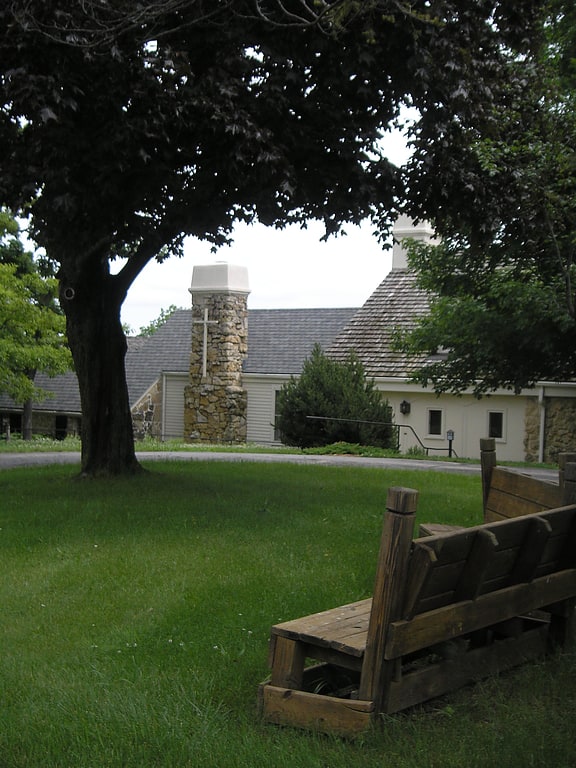
Abbey in Dubuque County, Iowa. The Abbey of Our Lady of the Mississippi is located near Dubuque, Iowa. The nuns there are members of the branch of the Order of Cistercians of the Strict Observance, commonly referred to as Trappistines. They are a part of the Catholic Church in the Archdiocese of Dubuque.[26]
Holy Ghost Catholic Church
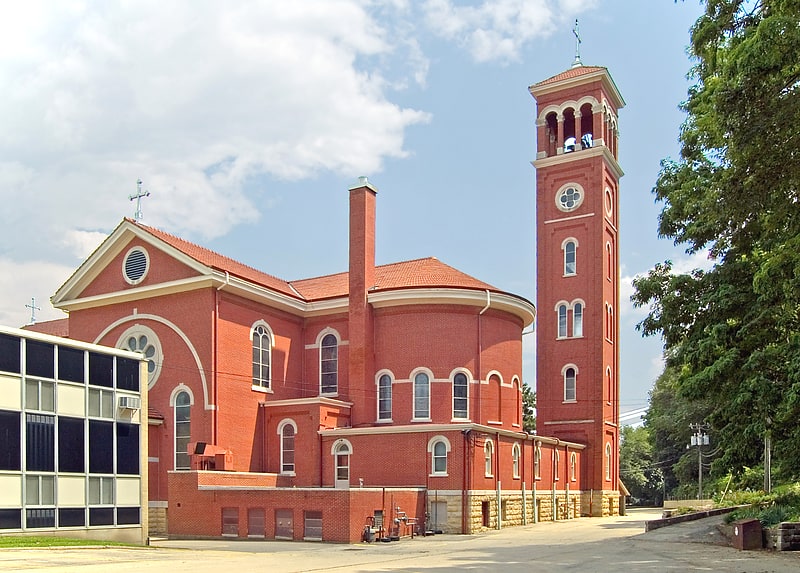
Catholic church in Dubuque, Iowa. Holy Ghost Catholic Church is a Catholic parish located within the city of Dubuque, Iowa, United States. It is part of the Archdiocese of Dubuque. The church, school, rectory, and convent were listed together as a historic district on the National Register of Historic Places in 2011.[27]
Mines of Spain State Recreation Area and E. B. Lyons Nature Center
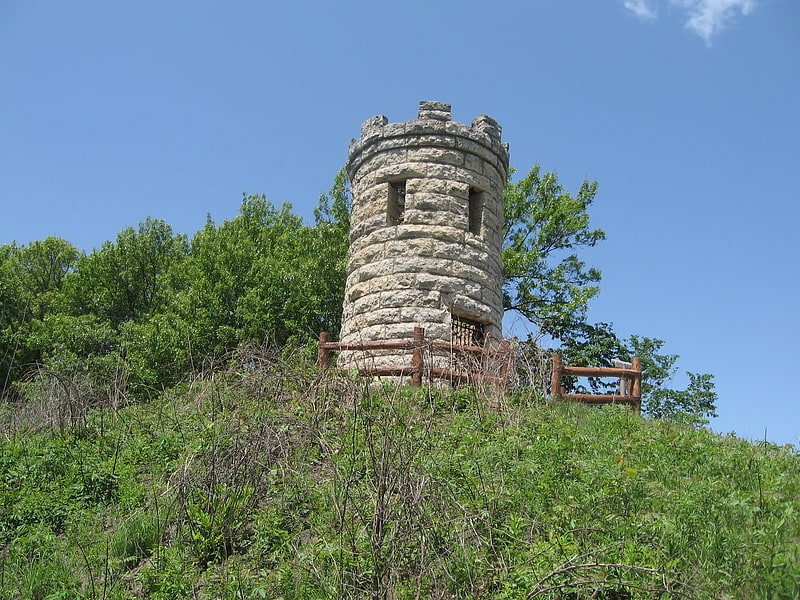
State park in the Dubuque County, Iowa. The Mines of Spain State Recreation Area and E. B. Lyons Nature Center is a state park in Dubuque County, Iowa, United States. It is near Dubuque, the eighth-largest city in the state. The park features picnic areas, 15 miles of walking/hiking trails, 4 miles of ski trails, and the Betty Hauptli Bird and Butterfly Garden. It also includes archaeological sites of national importance as an early lead mining and smelting venture led by French explorer Julien Dubuque, as well as Dubuque's gravesite. These sites were collectively designated a National Historic Landmark District as Julien Dubuque's Mines.[28]
Fenelon Place Elevator
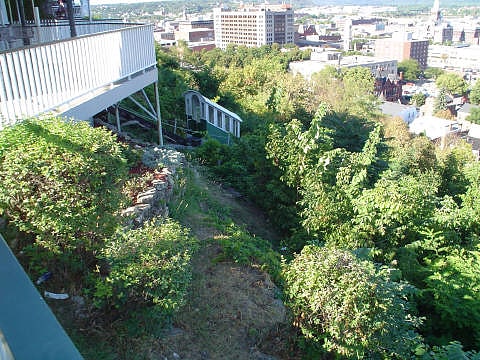
Elevator service in Dubuque, Iowa. The Fenelon Place Elevator is a 3 ft narrow gauge funicular railway located in Dubuque, Iowa. Also known as the Fourth Street Elevator, it is claimed to be the shortest and steepest railroad in the world. It was individually listed in the National Register of Historic Places in 1978. It was included as a contributing property in the Cathedral Historic District in 1985, and in the Fenelon Place Residential Historic District in 2015.[29]
St. John's Episcopal Church
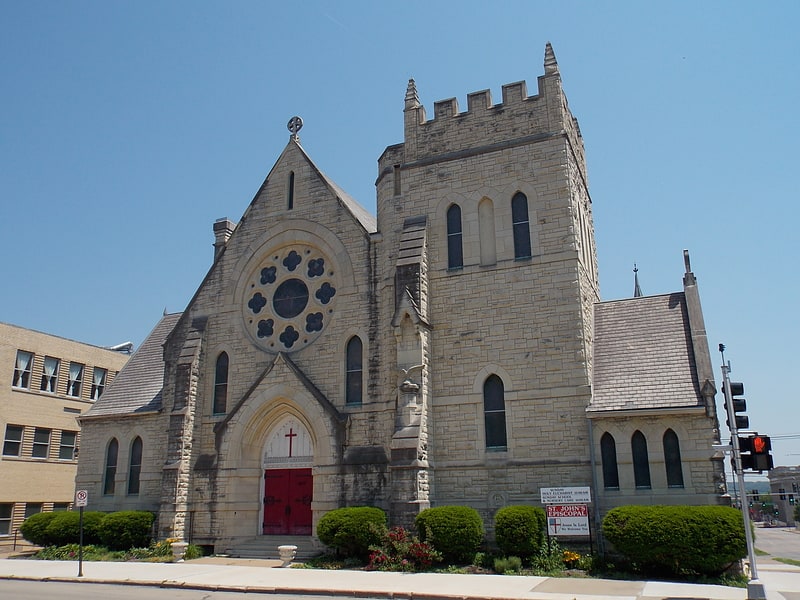
Episcopal church in Dubuque, Iowa. St. John's Episcopal Church is a parish of the Diocese of Iowa, located in Dubuque, Iowa, United States. The church was included as a contributing property in the Jackson Park Historic District that was listed on the National Register of Historic Places in 1986.[30]
Address: 1458 Locust St, Dubuque
Linwood Cemetery
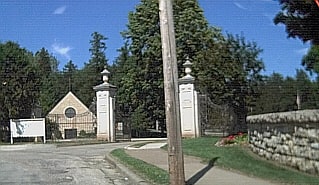
Cemetery in Dubuque, Iowa. Linwood Cemetery is located in Dubuque, Iowa, United States. It is located on Windsor Avenue in the north end of Dubuque.[31]
Address: 2735 Windsor Ave, 52001 Dubuque
Saint Mary's Catholic Church
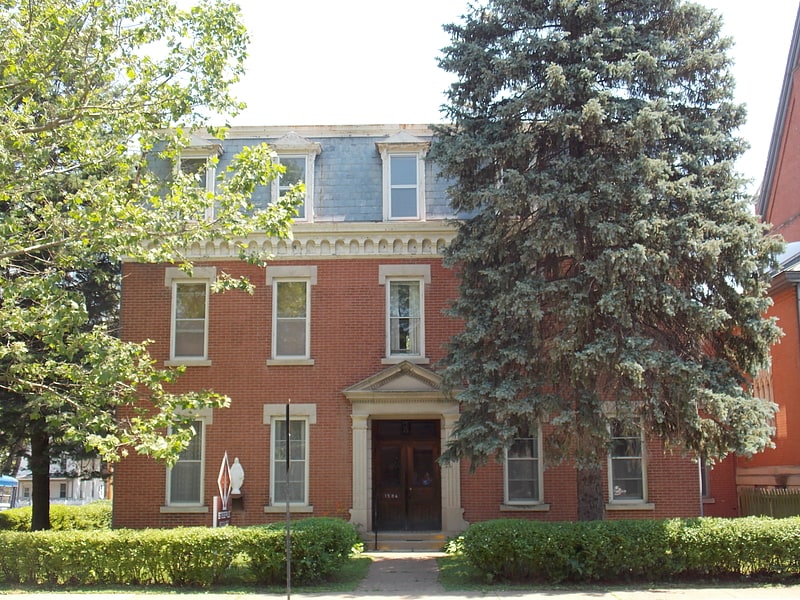
Building. Saint Mary's Catholic Church is a former parish of the Archdiocese of Dubuque. The church is located in Dubuque, Iowa, United States, at the corner of 15th and White Streets. The church is recognizable by its steeple– one of the tallest in the area. The church property was added to the National Register of Historic Places as an historic district in 2015, and the various buildings were included as contributing properties in the Washington Residential Historic District later in the same year.[32]
Saint Joseph the Worker Catholic Church
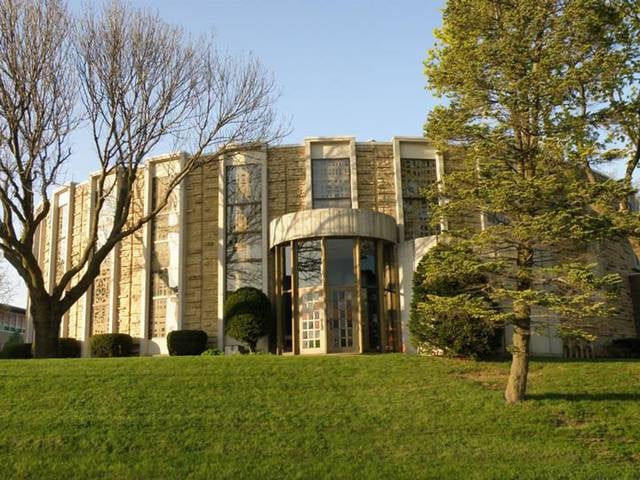
Catholic church in Dubuque, Iowa. Saint Joseph the Worker Catholic Church is a Catholic parish located in Dubuque, Iowa. It is part of the Archdiocese of Dubuque. The parish became the tenth Catholic parish in Dubuque when it was created in 1949 by Archbishop Rohlman. The current pastor of the parish is Father Jim Goerend.
Prior to the construction of the first church, the parish offices were located at Mercy Hospital. Weekend masses were held at Washington Junior High School. Eventually a parish church was built at the current location at 90 S. Algona, Dubuque.
In the late 1960s, a new parish church was built. This new church building was a departure from the traditional church buildings of the past. The church was a circular structure where the congregation sat in a semicircle around the altar. The church is noted for its stained glass windows.
Originally, the parish was named Saint Joseph's Church. There was another Saint Joseph's parish about three miles away, in Key West, Iowa. At times, one of the two parishes would receive mail intended for the other parish. In order to distinguish between the two parishes, the name was changed to St. Joseph the Worker parish in the 1990s. The parish is one of the larger parishes in Dubuque, mainly because of its location near the west end of the city.
The church was vandalized and damaged by arson in 2003. Anti-religious graffiti was found on the walls, as was a number of beer cans. A fire was found to have been burning on the main altar. The church sustained about $100,000 worth of damage. The next day, the pastor removed the Eucharist from the building. The building was then cleaned and repaired by a company that specialized in repairing and cleaning fire damaged buildings. A nearby Methodist church that had moved to a new facility donated their old church building while cleaning and repairs were being done. A young man whose family belonged to the parish had eventually confessed to the crime, he had committed it after a night of drinking and drug use.[33]
Address: 60 S Algona Street, Dubuque